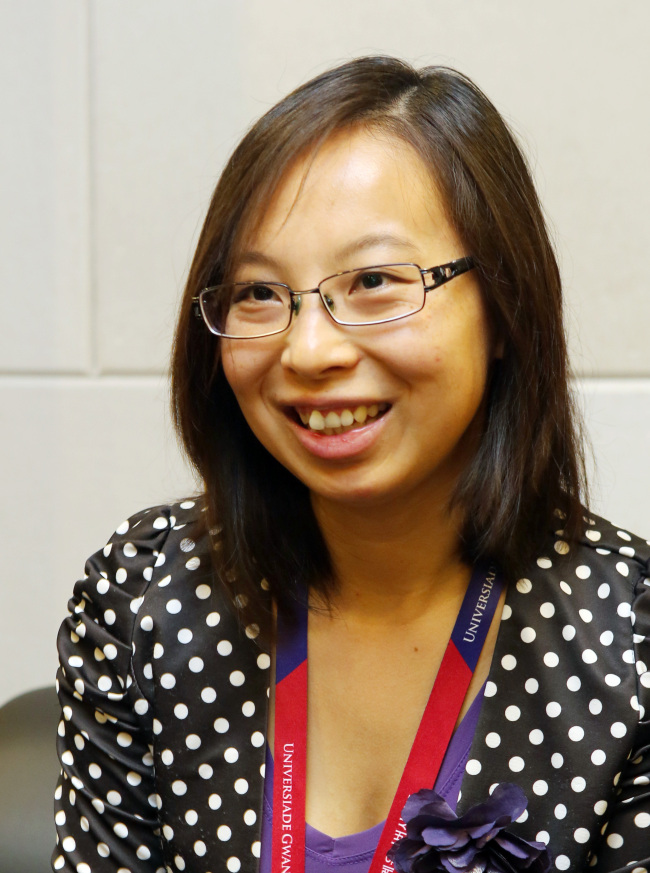Jing Zhao, manager of the Summer Universiade for the International University Sports Federation, has an immense responsibility in the non-sports activities such as transportation, security and food and beverages.
In close collaboration with the Gwangju Universiade Organizing Committee (GUOC), she has to ensure non-sports activities and the venues, especially the Athletes Village, are operating efficiently without setbacks until the end of the games. If problems arise, the two organizations seek to find solutions together.
 |
Jing Zhao |
Also, her top priority includes making sure the delegations have a pleasant experience by continuously “advising, supervising and assisting” the GUOC.
“Our role is to make sure that the ‘bottom line’ is met -- the minimum requirements for the Summer Universiade,” Zhao, 33, said in an interview.
“This is a very special Universiade with a different concept, and at the operational level, people here have been very friendly, efficient and cooperative.”
Zhao, the FISU’s first Asian manager, has been working with Gwangju over the last six years -- the average time it takes to prepare for a Universiade -- since the city won the bid to host the games in 2009.
She first worked as a volunteer for the 2001 Beijing Universiade, and worked for the Federation of University Sport of China, a FISU member. Zhao then joined the FISU as an Universiade assitant in 2008.
The following are excerpts from an interview with Jing Zhao, the FISU’s Universiade manager. – Ed.What is your main role and responsibility?Zhao: I am coordinating with the organizing committee catering to non-sports activities such as logistics and security to ensure that they have a good delivery. The GUOC is planning, managing and organizing the event. We are here to give them the minimum requirements telling them this is what the event needs, and we give them guidance on how to do it. And we supervise its delivery.
We are also troubleshooters. Even though the planning was perfect, you always have something to make up. We sit down with the GUOC, listen to the delegations to see what can be improved, and try to find solutions together.
What were some problems you dealt with to find solutions?Zhao: The Athletes Village is a core venue. Because it is a huge village, some working procedures were not implemented the way we expected. So, we needed to modify the procedure to make sure it works.
This is actually where I am every day. I am at the village minimum 12 hours a day to check whether things are working. For example, in the bathrooms, the delegations would prefer to have shower curtains, the GUOC bought 2,000 curtains and fitted them. Due to cultural differences, we always face these kinds of things. It pops up, and we work together with the GUOC.
What were the most challenging aspects of the games?
Zhao: Security is always a challenge. Here in Gwanggju, young (security) people are super-friendly, and they are always happy to let you know why (they need to conduct security). It is an annoying procedure, but Gwangju is doing it differently as the host city is making it relaxing and flexible. The organizers are using their hospitality, humor and (friendly) manner to make a very annoying procedure a pleasant one.
When did you first join the FISU?Zhao: My first job with the Universiade was in 2001 in Beijing. I applied for a volunteer program then. After my college graduation, I got a job with the Federation of University Sport of China, which is a member of the FISU, where I worked at the international relations team for about two years. Then I applied to the FISU as a Universiade assistant in 2008. That was my initial title. As an assistant, I was the first Asian employee.
What can you say about your experience with the FISU?
Zhao: The FISU is an incredible platform where you can cope with different situations and people with diverse backgrounds and from different countries, and exchange ideas with them.
By Park Hyong-ki (
hkp@heraldcorp.com)








